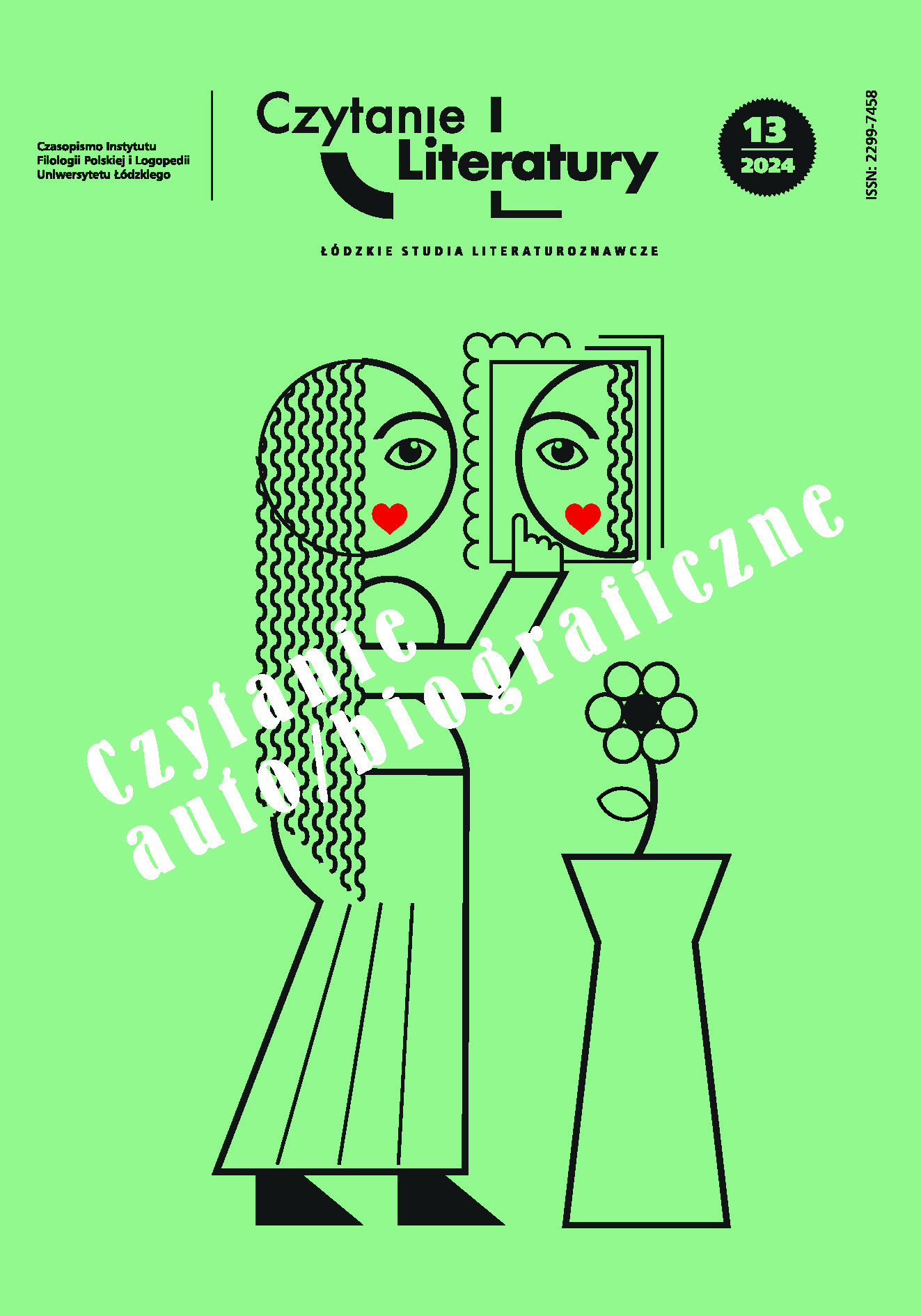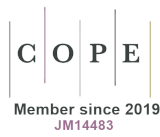Między autobiografią a autofikcją – (o)powieść Małgorzaty Halber Najgorszy człowiek na świecie
DOI:
https://doi.org/10.18778/2299-7458.13.11Słowa kluczowe:
Małgorzata Halber, autofikcja, sobąpisanie, polska literatura najnowszaAbstrakt
Autorka artykułu docieka, czy Najgorszego człowieka na świecie Małgorzaty Halber można sklasyfikować jako autobiografię. W swoich rozważaniach sięga do klasycznych badań naukowych autorstwa Małgorzaty Czermińskiej, Philippe’a Lejeune’a oraz Paula de Manna. Przeprowadzona analiza pozwala autorce na wysunięcie wniosku, że elementy autobiograficzne występujące w powieści Halber znacząco wpływają na kształtowanie się narracji tekstu oraz czytelniczy odbiór dzieła. Okazuje się również, że utrudniają one określenie statusu Najgorszego człowieka na świecie, gdyż proza ta łączy w sobie cechy zarówno autobiografii, jak i fikcji literackiej. Dla autorki kluczowe jest także odnalezienie odpowiedzi na pytanie: dlaczego Halber – kobieta, która dokonała chorobowego coming outu i przyznaje się do swojego uzależnienia oraz leczenia – ukrywa się za postacią fikcyjną. Wydaje się, że odpowiedzią na to pytanie jest potrzeba skupienia uwagi na problemie alkoholizmu – a nie na osobie autora – uniwersalizacja doświadczenia alkoholowego oraz zminimalizowanie własnego wstydu.
Pobrania
Bibliografia
Ahmed S., Wstyd w obliczu innych, przeł. J. Misun, „Teksty Drugie” 2016, nr 4, s. 194–212.
Google Scholar
DOI: https://doi.org/10.18318/td.2016.4.13
Chłosta-Zielonka J., Być inną – o kategorii różnicy w autobiograficznych wypowiedziach kobiet XX i XXI wieku, „Prace Literaturoznawcze” 2018, nr 6, s. 59–74.
Google Scholar
Czermińska M., Autobiograficzny trójkąt: świadectwo, wyznanie i wyzwanie, Kraków 2000.
Google Scholar
Czermińska M., O autobiografii i autobiograficzności, [w:] Autobiografia, red. M. Czermińska, Gdańsk 2009, s. 5–17.
Google Scholar
Czyżak A., Autofikcja, „Autobiografia. Literatura. Kultura. Media” 2020, nr 2, s. 93–98.
Google Scholar
DOI: https://doi.org/10.18276/au.2020.2.15-07
De Man P., Autobiografia jako od-twarzanie, przeł. M.B. Fedewicz, „Pamiętnik Literacki” 1986, nr 2, s. 307–318.
Google Scholar
Foucault M., Sobąpisanie, [w:] M. Foucault, Powiedziane, napisane. Szaleństwo i literatura, przeł. M.P. Markowski, Warszawa 1999, s. 303–319.
Google Scholar
Halber M., Najgorszy człowiek na świecie, Kraków 2015.
Google Scholar
Hellich A., Gry z autobiografią: przemilczenia, intelektualizacje, parodie, Warszawa 2018.
Google Scholar
Iwasiów I., „Niosło ją to, że stała u boku”. O genderowym modelowaniu biografii artystek, „Autobiografia” 2015, nr 2, s. 63–74.
Google Scholar
DOI: https://doi.org/10.18276/au.2015.2.5-05
Legeżyńska A., Wystarczy mocno i wytrwale zastanawiać się nad jednym życiem… Biografistyka jako hermeneutyczne wyzwanie, „Teksty Drugie” 2019, nr 1, s. 13–27.
Google Scholar
DOI: https://doi.org/10.18318/td.2019.1.2
Lejeune P., Pakt autobiograficzny, przeł. A.W. Labuda, „Teksty” 1975, nr 5, s. 31–49.
Google Scholar
Nasiłowska A., Zwrot biograficzny, „Dwutygodnik” 2009, nr 16, http://www.dwutygodnik.com/artykul/553-biografie-zwrot-biograficzny.html [dostęp: 17.01.2024].
Google Scholar
Nycz R., Syllepsis, [w:] R. Nycz, Język modernizmu. Prolegomena historycznoliterackie, Toruń 2013, s. 113–121.
Google Scholar
Orbitowski Ł., „Najgorszy człowiek na świecie”: Halber przepłynęła ocean pogardy do samej siebie, „Gazeta Wyborcza” 2015, nr z 4.02.
Google Scholar
Pastuszko M., Skończyłam tę terapię i będę jej bronić, „Krytyka Polityczna” 2019, https://krytykapolityczna.pl/kultura/czytaj-dalej/skonczylam-te-terapie-i-bede-jej-bronic/ [dostęp: 13.01.2023].
Google Scholar
Pekaniec A., Autobiografki. Szkice o literaturze dokumentu osobistego kobiet, Kraków 2020.
Google Scholar
Pekaniec A., Dlaczego (auto)biografie? Literatura dokumentu osobistego kiedyś i dziś, „Autobiografia. Literatura. Kultura. Media” 2022, nr 1, s. 125–144.
Google Scholar
DOI: https://doi.org/10.18276/au.2022.1.18-11
Sekielski o nałogach: Małgorzata Halber, cudowne dziecko z domu alkoholików, wideo online, 25 sierpnia 2020, https://www.youtube.com/watch?v=2UVT9g8SFOI [dostęp: 26.01.2024].
Google Scholar
Sendyka R., Sobąpisanie, ćwiczenia duchowe i Foucault jako parezjasta, [w:] R. Sendyka, Od kultury „ja” do kultury siebie. O zwrotnych formach w projektach tożsamościowych, Kraków 2015, s. 251–287.
Google Scholar
Sosin N., Małgorzata Halber: Kiedy przestajesz pić, wszystkiego uczysz się od nowa. Tańczyć, kochać się, rozmawiać z ludźmi na trzeźwo, „weekend.gazeta.pl” 2015, https://weekend.gazeta.pl/weekend/7,152121,17316466,malgorzata-halber-kiedy-przestajesz-pic-wszystkiego-uczysz.html [dostęp: 13.01.2023].
Google Scholar
Stawiszyński T., Stawiszyński: Człowiek taki jak my, „Krytyka Polityczna” 2015, https://krytykapolityczna.pl/narkopolityka/polskienarko/stawiszynski-czlowiek-taki-jak-my/ [dostęp: 10.02.2023].
Google Scholar
Strachota J., Żulczyk J., Co ćpać po odwyku. Małgorzata Halber, podcast, Spotify, 8 grudnia 2021, https://open.spotify.com/episode/3JMnAsBfqL1Eu-V62NMHBkW [dostęp: 2.02.2024].
Google Scholar
Sutowski M., Halber: kto powiedział, że życie ma być spójne? [rozmowa], „Krytyka Polityczna” 2015, https://krytykapolityczna.pl/kultura/czytaj-dalej/halber-kto-powiedzial-ze-zycie-ma-byc-spojne-rozmowa/ [dostęp: 10.02.2023].
Google Scholar
Szubert T., Wstyd w dyskursie kulturowym, „Ethos” 2017, nr 2, s. 51–69.
Google Scholar
Tomkins S., Wstyd-upokorzenie a pogarda-wstręt: natura reakcji, przeł. B. Szumański i W. Szwebs, „Teksty Drugie” 2016, nr 4, s. 163–173.
Google Scholar
DOI: https://doi.org/10.18318/td.2016.4.11
Turczyn A., Autofikcja, czyli autobiografia psychopolifoniczna, „Teksty Drugie” 2007, nr 1–2, s. 204–211.
Google Scholar
Zgierski J., Wyznaliśmy istotę naszych błędów, „Dwutygodnik” 2015, nr 151, https://www.dwutygodnik.com/artykul/5691-wyznalismy-istote-naszych-bledow.html [dostęp: 22.01.2024].
Google Scholar
Pobrania
Opublikowane
Jak cytować
Numer
Dział
Licencja

Utwór dostępny jest na licencji Creative Commons Uznanie autorstwa – Użycie niekomercyjne – Bez utworów zależnych 4.0 Międzynarodowe.










